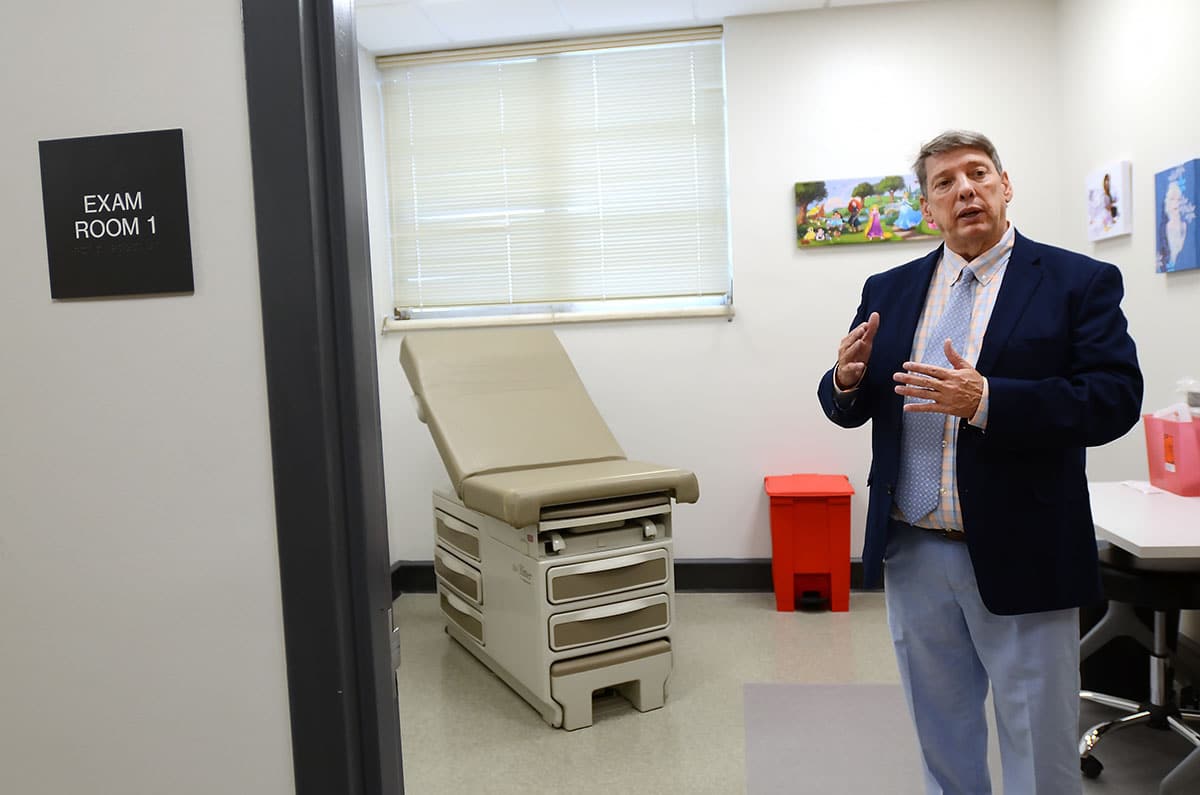Mississippi Today
No answers, no money: Lauderdale officials end funding to state health agency for county health department

The Lauderdale County Board of Supervisors decided this year not to award over $200,000 to the state health agency for the operation of the county health department as it had done the previous year.
But Lauderdale officials say that’s not because they don’t care about public health — in fact, they’re spending more than $2 million of their pandemic relief funds upgrading the facility’s air-conditioning system.
They say it’s because the Mississippi State Department of Health couldn’t adequately answer what that money was going toward.
County health departments are funded by a mixture of state and county money. Usually, the county provides a building, while the Health Department provides staffing, according to State Health Officer Dr. Daniel Edney. The facilities provide essential public health services such as vaccinations, STI testing, diabetes and hypertension care, pap smears, pregnancy testing and more.
And as hospitals struggle amid a statewide health care crisis and more of the state’s wellbeing may fall on publicly funded health care, Edney has stressed the importance of these local clinics.
The state Department of Health has been tasked with mounting responsibilities over the years, but their state funding has remained relatively stable. Health officials are still reeling from the pandemic, and 40% of positions at the agency were unfilled as of May.

Edney acknowledged at last month’s state Board of Health meeting that his agency had dropped the ball with Lauderdale, and it may not be an isolated incident.
“We did not do a good enough job with that board,” he said. “Fires break out — I personally have been going and putting those fires out — but we’re already talking internally about doing a better job on our regional level of our folks being at board of supervisors meetings, just going and saying, ‘Hello.’”
Chris Lafferty, administrator of Lauderdale County, isn’t aware of any changes at the county health department, so he didn’t realize there was a “fire.” His conversations with Mississippi Today this week was the first time he had heard of any issues, he said.
“The question of need comes up — was the money really needed? If it was, why didn’t they articulate that?” Lafferty said. “None of the local leadership has contacted us. Now they’re all over it. They’ve had a year.”
In 2022, Lafferty sent a letter to Susan Rigdon, a division director at the agency, informing her that the Board of Supervisors didn’t approve any funding for the agency. The previous year, the board had allocated $242,100 in its $65 million budget to the Department of Health.
Lafferty said he hadn’t heard back from the agency, nor did he hear any complaints, until Mississippi Today recounted a quote from Edney at a state Board of Health meeting on July 12, more than nine months later.
“It was a $200,000-a-year appropriation that (Lauderdale County) defunded,” Edney said at the meeting. “They took us out of their budget totally.”
According to Lafferty, it wasn’t an easy decision. More than a year ago, the Board of Supervisors was determined to avoid a tax increase in Lauderdale, and Lafferty started looking at how to save dollars.
So, he called David Caulfield, the Health Department’s regional administrator for the Central Public Health Region which includes Lauderdale and 27 other counties. Lafferty wanted him to explain where the nearly quarter of a million dollars was going – whether it was staying in Lauderdale County and what services it was funding. Caulfield couldn’t tell him, Lafferty said.
“I think those are reasonable questions,” he said. “I cannot in good conscience … ask the Board of Supervisors to give money to an organization that could not answer simple questions.”
Lafferty recommended to the Board of Supervisors, then, that the funding be cut, and Lauderdale County did not have a tax hike last year, he said.

According to Lafferty, no services have been cut or reduced at the county health department as a result – which begged the question, what did the Department of Health do with the $242,100 last year?
Mississippi Today reached out to the Health Department on July 31 with questions about Lauderdale County’s funding to their agency.
The agency replied with an emailed statement that said it provided the same information to Lauderdale County last year as it had in prior years, but it’s unclear what specific information that included.
“Each year, information is provided to each county board of supervisors that includes overall budget information of each county health department and the services these funds support,” the emailed statement from spokesperson Liz Sharlot reads. “Our local administrators also meet with county officials, as needed, to answer any questions and provide additional information. This information was provided to Lauderdale last year as it had been provided in years past.”
The statement goes on to say that the money from Lauderdale was funding county health department personnel as well as equipment and supplies.
Mississippi Today reached out to the state Health Department again on Tuesday with follow-up questions, including whether the Health Department provided the county officials with the information they sought regarding how the money was spent and how the supervisors’ decision not to award the agency any money impacted the county health department’s operations.
Spokesperson Elizabeth Grey did not answer any specific questions, including if and how the Lauderdale County Health Department was impacted. She said on Thursday that Edney and Caulfield were working to schedule a meeting with the Lauderdale County Board of Supervisors to rectify the situation — after that meeting, the agency would respond to Mississippi Today’s questions, she said.
Mississippi state law mandates that county supervisors “shall be authorized” to make necessary appropriations to the Department of Health to pay the salary of the employees of the county health department, as well as supplies. It goes on to say more clearly that the board “shall provide” an office, or building, for the health department.
It’s not clear if most counties are providing additional funding beyond building costs for their health departments — the state Health Department did not respond to that question from Mississippi Today.
Jonathan Wells, president of the Lauderdale County Board of Supervisors, says the county provides a building — and more.
“So, the Legislature says — and I would call it an unfunded mandate — that we supply the Department of Health a building,” he said. “Not only are we doing that, but we’re putting $2.5 million in ARPA (American Rescue Plan Act) money into a new HVAC system for that building.”
The county continues to pay for utilities in that building, security services as well as other general upkeep, Wells said.
That won’t change next year, according to Lafferty — but neither will their zero-dollar allocation toward the State Health Department.
On Wednesday, Caulfield visited Lafferty in his office, holding a budget request for the upcoming year in his hands, he said. Lafferty says he is still unclear what the county’s funding responsibilities are and will recommend that the Board of Supervisors continue to withhold funding to the state Department of Health.
This article first appeared on Mississippi Today and is republished here under a Creative Commons license.
Did you miss our previous article…
https://www.biloxinewsevents.com/?p=275938
Mississippi Today
1964: Mississippi Freedom Democratic Party was formed
April 26, 1964

Civil rights activists started the Mississippi Freedom Democratic Party to challenge the state’s all-white regular delegation to the Democratic National Convention.
The regulars had already adopted this resolution: “We oppose, condemn and deplore the Civil Rights Act of 1964 … We believe in separation of the races in all phases of our society. It is our belief that the separation of the races is necessary for the peace and tranquility of all the people of Mississippi, and the continuing good relationship which has existed over the years.”
In reality, Black Mississippians had been victims of intimidation, harassment and violence for daring to try and vote as well as laws passed to disenfranchise them. As a result, by 1964, only 6% of Black Mississippians were permitted to vote. A year earlier, activists had run a mock election in which thousands of Black Mississippians showed they would vote if given an opportunity.
In August 1964, the Freedom Party decided to challenge the all-white delegation, saying they had been illegally elected in a segregated process and had no intention of supporting President Lyndon B. Johnson in the November election.
The prediction proved true, with white Mississippi Democrats overwhelmingly supporting Republican candidate Barry Goldwater, who opposed the Civil Rights Act. While the activists fell short of replacing the regulars, their courageous stand led to changes in both parties.
This article first appeared on Mississippi Today and is republished here under a Creative Commons Attribution-NoDerivatives 4.0 International License.![]()
Mississippi Today
Mississippi River flooding Vicksburg, expected to crest on Monday
Warren County Emergency Management Director John Elfer said Friday floodwaters from the Mississippi River, which have reached homes in and around Vicksburg, will likely persist until early May. Elfer estimated there areabout 15 to 20 roads underwater in the area.
“We’re about half a foot (on the river gauge) from a major flood,” he said. “But we don’t think it’s going to be like in 2011, so we can kind of manage this.”
The National Weather projects the river to crest at 49.5 feet on Monday, making it the highest peak at the Vicksburg gauge since 2020. Elfer said some residents in north Vicksburg — including at the Ford Subdivision as well as near Chickasaw Road and Hutson Street — are having to take boats to get home, adding that those who live on the unprotected side of the levee are generally prepared for flooding.



“There are a few (inundated homes), but we’ve mitigated a lot of them,” he said. “Some of the structures have been torn down or raised. There are a few people that still live on the wet side of the levee, but they kind of know what to expect. So we’re not too concerned with that.”
The river first reached flood stage in the city — 43 feet — on April 14. State officials closed Highway 465, which connects the Eagle Lake community just north of Vicksburg to Highway 61, last Friday.

Elfer said the areas impacted are mostly residential and he didn’t believe any businesses have been affected, emphasizing that downtown Vicksburg is still safe for visitors. He said Warren County has worked with the U.S. Army Corps of Engineers and the Mississippi Emergency Management Agency to secure pumps and barriers.
“Everybody thus far has been very cooperative,” he said. “We continue to tell people stay out of the flood areas, don’t drive around barricades and don’t drive around road close signs. Not only is it illegal, it’s dangerous.”
NWS projects the river to stay at flood stage in Vicksburg until May 6. The river reached its record crest of 57.1 feet in 2011.




This article first appeared on Mississippi Today and is republished here under a Creative Commons Attribution-NoDerivatives 4.0 International License.![]()
Mississippi Today
With domestic violence law, victims ‘will be a number with a purpose,’ mother says
Joslin Napier. Carlos Collins. Bailey Mae Reed.
They are among Mississippi domestic violence homicide victims whose family members carried their photos as the governor signed a bill that will establish a board to study such deaths and how to prevent them.
Tara Gandy, who lost her daughter Napier in Waynesboro in 2022, said it’s a moment she plans to tell her 5-year-old grandson about when he is old enough. Napier’s presence, in spirit, at the bill signing can be another way for her grandson to feel proud of his mother.
“(The board) will allow for my daughter and those who have already lost their lives to domestic violence … to no longer be just a number,” Gandy said. “They will be a number with a purpose.”
Family members at the April 15 private bill signing included Ashla Hudson, whose son Collins, died last year in Jackson. Grandparents Mary and Charles Reed and brother Colby Kernell attended the event in honor of Bailey Mae Reed, who died in Oxford in 2023.
Joining them were staff and board members from the Mississippi Coalition Against Domestic Violence, the statewide group that supports shelters and advocated for the passage of Senate Bill 2886 to form a Domestic Violence Facility Review Board.
The law will go into effect July 1, and the coalition hopes to partner with elected officials who will make recommendations for members to serve on the board. The coalition wants to see appointees who have frontline experience with domestic violence survivors, said Luis Montgomery, public policy specialist for the coalition.
A spokesperson from Gov. Tate Reeves’ office did not respond to a request for comment Friday.
Establishment of the board would make Mississippi the 45th state to review domestic violence fatalities.
Montgomery has worked on passing a review board bill since December 2023. After an unsuccessful effort in 2024, the coalition worked to build support and educate people about the need for such a board.
In the recent legislative session, there were House and Senate versions of the bill that unanimously passed their respective chambers. Authors of the bills are from both political parties.
The review board is tasked with reviewing a variety of documents to learn about the lead up and circumstances in which people died in domestic violence-related fatalities, near fatalities and suicides – records that can include police records, court documents, medical records and more.
From each review, trends will emerge and that information can be used for the board to make recommendations to lawmakers about how to prevent domestic violence deaths.
“This is coming at a really great time because we can really get proactive,” Montgomery said.
Without a board and data collection, advocates say it is difficult to know how many people have died or been injured in domestic-violence related incidents.
A Mississippi Today analysis found at least 300 people, including victims, abusers and collateral victims, died from domestic violence between 2020 and 2024. That analysis came from reviewing local news stories, the Gun Violence Archive, the National Gun Violence Memorial, law enforcement reports and court documents.
Some recent cases the board could review are the deaths of Collins, Napier and Reed.
In court records, prosecutors wrote that Napier, 24, faced increased violence after ending a relationship with Chance Fabian Jones. She took action, including purchasing a firearm and filing for a protective order against Jones.
Jones’s trial is set for May 12 in Wayne County. His indictment for capital murder came on the first anniversary of her death, according to court records.
Collins, 25, worked as a nurse and was from Yazoo City. His ex-boyfriend Marcus Johnson has been indicted for capital murder and shooting into Collins’ apartment. Family members say Collins had filed several restraining orders against Johnson.
Johnson was denied bond and remains in jail. His trial is scheduled for July 28 in Hinds County.
He was a Jackson police officer for eight months in 2013. Johnson was separated from the department pending disciplinary action leading up to immediate termination, but he resigned before he was fired, Jackson police confirmed to local media.
Reed, 21, was born and raised in Michigan and moved to Water Valley to live with her grandparents and help care for her cousin, according to her obituary.
Kylan Jacques Phillips was charged with first degree murder for beating Reed, according to court records. In February, the court ordered him to undergo a mental evaluation to determine if he is competent to stand trial, according to court documents.
At the bill signing, Gandy said it was bittersweet and an honor to meet the families of other domestic violence homicide victims.
“We were there knowing we are not alone, we can travel this road together and hopefully find ways to prevent and bring more awareness about domestic violence,” she said.
This article first appeared on Mississippi Today and is republished here under a Creative Commons Attribution-NoDerivatives 4.0 International License.
-

 News from the South - Florida News Feed6 days ago
News from the South - Florida News Feed6 days agoJim talks with Rep. Robert Andrade about his investigation into the Hope Florida Foundation
-

 News from the South - Alabama News Feed5 days ago
News from the South - Alabama News Feed5 days agoPrayer Vigil Held for Ronald Dumas Jr., Family Continues to Pray for His Return | April 21, 2025 | N
-

 Mississippi Today5 days ago
Mississippi Today5 days ago‘Trainwreck on the horizon’: The costly pains of Mississippi’s small water and sewer systems
-

 News from the South - Florida News Feed4 days ago
News from the South - Florida News Feed4 days agoTrump touts manufacturing while undercutting state efforts to help factories
-

 News from the South - Texas News Feed5 days ago
News from the South - Texas News Feed5 days agoMeteorologist Chita Craft is tracking a Severe Thunderstorm Warning that's in effect now
-

 News from the South - Florida News Feed4 days ago
News from the South - Florida News Feed4 days agoFederal report due on Lumbee Tribe of North Carolina’s path to recognition as a tribal nation
-

 News from the South - Arkansas News Feed6 days ago
News from the South - Arkansas News Feed6 days agoAs country grows more polarized, America needs unity, the ‘Oklahoma Standard,’ Bill Clinton says
-

 News from the South - Oklahoma News Feed4 days ago
News from the South - Oklahoma News Feed4 days agoOklahoma Treasurer’s Office Faces Scrutiny Over Use of Signal in Anti-ESG Coordination














































